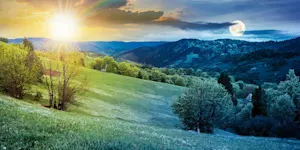What Makes This Word Tick
Ah, "solstice," a word that brings with it a sense of celestial wonder. It refers to those two wondrous moments each year when the sun reaches its highest or lowest point in the sky at noon, marking the longest and shortest days of the year. It's more than just an astronomical event; it's a reminder of nature's rhythmic dance through the cosmos.
If Solstice Were a Person…
Picture Solstice as an elegant, somewhat mysterious figure who loves to surprise. In winter, they'd be clad in cozy furs, inviting you to huddle around a warm fire, while in summer, they'd don a radiant sun hat and beckon you to bask under the longest day. They're the life of the party in both serene introspection and joyful revelry.
How This Word Has Changed Over Time
Solstice has retained its core meaning over centuries, linked closely to its Latin roots, "sol" (sun) and "sistere" (to stand still). While it still denotes those solar transitions, modern conversations might lean towards its cultural and spiritual connotations, often involving celebrations that have been woven into human tradition for millennia.
Old Sayings and Proverbs That Use Solstice
"Solstice time, when the world pauses to catch its breath." While not an ancient proverb per se, this captures the essence of how cultures perceive these times: moments when time seems to suspend, offering reflection or renewal.
Surprising Facts About Solstice
Did you know that many ancient civilizations, including the Egyptians and the Incas, constructed monuments to mark the solstice? Stonehenge is famously aligned to capture the solstice sun, serving as a prehistoric calendar that still fascinates scientists and travelers alike.
Out and About With This Word
When the solstice approaches, it's not uncommon to see people gathering at beaches, parks, or mountaintops to greet the sun. Whether it’s watching the sun dip below the horizon or rise gloriously, solstice gatherings are filled with both jubilation and awe.
Pop Culture Moments Where Solstice Was Used
In pop culture, solstice often finds itself at the heart of fantasy books and movies that involve celestial events and magical occurrences. Whether it's the backdrop for a mystical adventure or the pivot of a climatic scene, the solstice adds a hint of mystery and grandeur.
The Word in Literature
Authors have long been drawn to the solstice, weaving it into stories that explore themes of transition and change. Whether it's symbolizing an internal journey or setting the stage for a narrative twist, the solstice is a metaphorical goldmine for writers exploring the cycles of life.
Moments in History with Solstice
On the summer solstice of 1897, the inspiring Midsummer Ball in Stockholm exemplified how this day has been historically treated as one of celebration in various cultures. The ball was highlighted by luminaries of the time reveling beneath the midnight sun.
This Word Around the World
In Sweden, the summer solstice is cause for the beloved Midsummer festival, filled with maypole dances and festive foods. In contrast, Iranians view the winter solstice, known as Yalda, as a time to gather with family, savoring the longest night with poetry and pomegranates.
Where Does It Come From?
The term originates from the Latin word "solstitium," which translates to "sun standing still," a fitting description of the sun's pause before reversing its celestial course. This vivid imagery endures through time, capturing the imagination of those who gaze skyward.
How People Misuse This Word
Some mistakenly use "solstice" to refer to any seasonal change or equinox. While both relate to the sun's movements, solstices are specifically the longest and shortest days, not the time of equal day and night, which belong to the equinoxes.
Words It’s Often Confused With
Equinox: Unlike the solstice, the equinox refers to the time when day and night are of approximately equal length.
Eclipse: Solstice might share the celestial theme, but it has nothing to do with the moon crossing the sun.
Additional Synonyms and Antonyms
While solstice doesn't have direct synonyms, words like "apex" or "zenith" capture the idea of reaching a peak. Antonyms might include "trough" or "nadir," symbolizing the lowest points.
Want to Try It Out in a Sentence?
"As the winter solstice approached, the village prepared its annual festival, ready to welcome the returning light with music and joy."
















